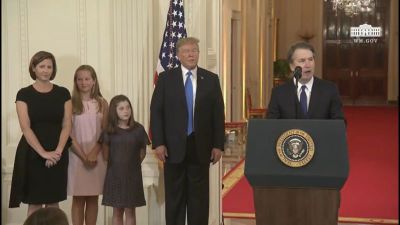Brett Kavanaugh: A Solid Choice to Join the Supremes

I've joined a number of evangelical leaders to formally support Brett Kavanaugh's nomination to the Supreme Court. Here's what we know.
On Monday night, President Trump announced his nomination of Brett Kavanaugh to fill the seat being vacated by retiring Supreme Court Justice Anthony Kennedy.
The obvious question for Christians is—or at least it should be—"What can we expect from Kavanaugh, especially in regard to the sanctity of human life and religious freedom?"
It's impossible, of course, to know that answer with absolute certainty. But there's reason to be hopeful that Kavanaugh is a reliable conservative and certainly preferable over anyone a Democratic president would have nominated.
As far as his level of experience, Kavanaugh is among the most qualified candidates in the country. He currently serves on the D.C. Circuit Court of Appeals, arguably the second-most important federal court.
Based on his judicial track record, conservative commentator Hugh Hewitt is probably close in calling Kavanaugh "John Roberts 2.0." Now not everyone, especially after Roberts's Obamacare decision, would consider that a compliment. Still, we can agree it's better than being a "Kennedy 2.0." Hewitt envisions Roberts and Kavanaugh leading a "new majority [that] will not invent new rights, but [that] will be busy protecting old ones... respectful of the states and their constitutionally protected sovereignty."
By all accounts, his judicial philosophy is, as was articulated in a statement formally supporting Kavanaugh that I co-signed with dozens of evangelical leaders, to be "impartial and faithful to the Constitution as it is, not as he ...wishes it to be."
And in particular, his track record on religious freedom is why I'm comfortable, as our statement says, urging the Senate to "work diligently to confirm his appointment without obstruction."
For example, in Priests for Life v. HHS, which challenged the contraceptive mandate, Kavanaugh wrote, "When the Government forces someone to take an action contrary to his or her sincere religious belief or else suffer a financial penalty, the Government has substantially burdened the individual's exercise of religion."
Despite the many reasons to be encouraged by the President's selection, I must admit that I've got a nagging sense of disappointment. I wonder if, as David French wrote in the Washington Post, passing over Appeals Court Judge Amy Coney Barrett was maybe a lost opportunity.
Now don't get me wrong. Kavanaugh is eminently qualified and will likely be confirmed with crazy hysteria but only modest resistance. On the other hand, Barrett's nomination would have put in play the issue of what place devout Christians have these days in American public life. She'd have been a riskier choice, no doubt. And part of the trepidation about her was that her faith played too big a role in her life.
As French put it, a Barrett nomination "represented a chance for an important cultural moment—an opportunity for the best of young professional Christians to face the worst of progressive anti-religion bias and prevail on the largest possible stage."
The central topic of progressive hysteria is, of course, abortion. Though neither Barrett nor Kavanaugh have a substantial paper trail on the issue, my guess is that a Catholic mother of seven—in whom, as Senator Dianne Feinstein put it, the "dogma lives loudly"—was the safer bet for all of us looking to roll back the current abortion regime.
On the other hand, Kavanaugh, in his acceptance speech, made clear his own Catholic commitments and family loyalties. It's reasonable to think he'd vote differently than the man he's replacing on cases like Whole Women's Health, which overturned Texas H.B. 2, a bill that regulated abortion clinics like other medical facilities.
Kavanaugh (aka "Coach K" by his daughter's basketball team) is certainly a good, safe pick. I would've been game for the more confrontational choice, but still, please join me in praying for a successful and speedy confirmation process. So much is at stake.
Originally posted at breakpoint.org




























